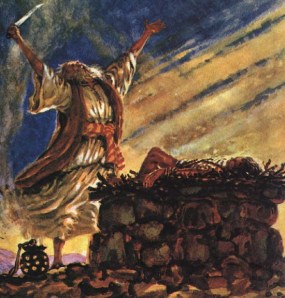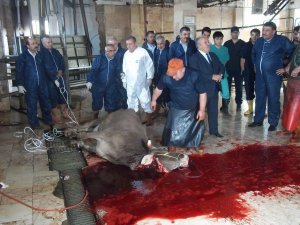Last week, Muslims the world over celebrated the second most important holiday in their religious calendar (behind Ramadan). Eid al-Adha – or Kurban Bayrami, here in Turkey – is a tradition dating back to biblical (or quranical) times. The Feast of the Sacrifice, as it’s called in English, originates thousands of years ago and is based on the story of Abraham and his son. Nowadays, the festival is celebrated much like the Korean holiday of Chuseok and the two Thanksgivings in both America and Canada. People travel to visit their grandparents and other extended family, stuff themselves on rich foods, and give thanks to their ancestors – and Allah – for all they have.

Growing up Catholic, I was taught the story of Abraham’s sacrifice. God asked Abraham to sacrifice his son, but as soon as he’d prepared and was ready to plunge his dagger into his boy’s chest, an angel of the Lord descended to stop him. Instead, Abraham was allowed to sacrifice a lamb in his son’s place.
I’m positive that anyone raised in a Jewish or Christian household knows this story. However, I was shocked to discover one major discrepancy between the Judeo-Christian version and the one subscribed to in Islam. Biblical scripture states that Abraham was willing to sacrifice his ‘only son’. Unfortunately, Abraham has two sons: Isaac and Ishmael.
Because Isaac was the son God promised to Abraham, Judeo-Christian tradition holds that he was the ‘only son’ mentioned. Isaac’s birth to Abraham’s barren wife, Sarah, was a miracle and the common understanding is that the word ‘only’ also means legitimate. Abraham’s line of succession, according to Judeo-Christian believers, can be traced through Isaac. Muslims have an alternate understanding of the translation and thus, a much different account of the story of Abraham’s sacrifice.
Thirteen years before the miracle of Isaac, God gave Abraham permission to lie with one of his servants and Ishmael was born. Muslims, who revere many of the same characters from the Bible, have agreed to a more literal translation of the phrase ‘only son.’ Ishmael was Abraham’s first born son and for 13 years only he, and not Isaac, could claim the title of ‘only son’. Therefore, while the Bible says Abraham began to sacrifice his son Isaac, the Quran states that he was about to sacrifice his son Ishmael. It is in celebration of Allah sparing Ishmael – whose line of succession went on to create the Muslim community – that the feast of the sacrifice occurs every year.
Why is this discrepancy important? The split between Abraham’s heirs has directly led to thousands of years of conflicts between the Judeo-Christian and Arab worlds: The Crusades, Israel and Palestine, and the War on Terror. It all boils down to which son you believe is the more important. One group stands firmly behind Isaac; the other, behind Ishmael.

Following September 11th 2001, my favorite television program, The West Wing, aired a special episode in an effort to help its audience understand why extremists from the Middle East had attacked the Western world. In the episode, a tour group of students becomes trapped in the White House mess and begin to ask the senior staff questions about Muslims and their hatred of America. Josh Lyman explained – rather eloquently – that, “Islamic extremists are to Islam as the KKK is to Christianity.”
The episode concluded with Abbey Bartlet, the First Lady, recounting the Biblical tale of Isaac and Ishmael. The last thing she says before her character leaves the scene fills the students, and the viewers, with hope for the future. What’s, “important to remember is that in the end, the two sons came together to bury their father.”
Muslims, Jews, and Christians aren’t as different as the powers-that-be would have us think. The pillars of the three monotheistic religions are – if not identical – too close to call. During my time in Turkey, I have found 99% of the population to be kind, generous, helpful, and honest. I’m unfortunately not sure I can say the same of those I know in the Christian community.
I hope that one day people of all religions can come together in peace in the same way Abraham’s sons joined together to honor their father’s life. Regardless of what belief structure you subscribe to, the story of Abraham’s sacrifice is emotionally charged. Muslims understand its importance and after experiencing my first Kurban Bayrami, I’m a bit surprised the event isn’t as celebrated in the West.
The holiday is centered around a feast (and a preceding time of fasting) during which families actually sacrifice a cow, goat, sheep, or in rare – and more affluent – cases, a camel to Allah. They then spread the meat around in three major ways. The first is their own, private meal which includes children, parents, grandparents, aunts, uncles, cousins, and close friends. The fresh meat is also gifted to others; one third is given out to friends and colleagues (yes, I received 5 kg of beef – approx 10 lbs), while another third is given to the poor and needy (I fell into both categories).

The animal is slaughtered by slicing its neck from one side to the other and allowing it to bleed out. Just before the kill, a prayer is said in Arabic and the Quran is quoted. Essentially, because God gave man reign over the beasts and birds along with permission to eat their meat, the sacrificial animal – or adhiya – is seen as a sacred blessing. The prayer before the slaughter is to remind mankind that meat is a gift from Allah and that while we’re eating the meat of the beasts, those animals should be respected.
Similar to the other autumnal Thanksgiving style holidays, Eid-al Adha is a week-long event during which people count their many blessings in life and strive to help those less fortunate. In Turkey, people journey far and wide to the villages of their ancestors so they may break bread (and camel) together. Sometimes the feast of one family can grow so large that 60 or more people join together in one room for the meal. Boys and girls, like the Koreans during Chuseok, kiss the hands of their elders for money and presents. Families sing songs, play games, and enjoy the company of loved ones.
This Bayram – as it’s commonly referred – I spent time in Istanbul, but that’s another blog.
Until Next Time…
-Justin
” During my time in Turkey, I have found 99% of the population to be kind, generous, helpful, and honest. I’m unfortunately not sure I can say the same of those I know in the Christian community.”
Then I fear you know the wrong kind of people in the Christian community. True Christians are loving people but just like many Muslims alike, they are not perfect either. 🙂 Nice blog! Very informative!
Justin: I like the history / religion lesson but not the comment “During my time in Turkey, I have found 99% of the population to be kind, generous, helpful, and honest. I’m unfortunately not sure I can say the same of those I know in the Christian community.”
If you travel to most places and are new to the area, you will find that almost everyone will be helpful to visitors. You’ve traveled across the US stopping along the way and lived in VA for a while and CA for awhile. Didn’t you find that to be the case?
Also you mention that “The pillars of the three monotheistic religions are – if not identical – too close to call.” I like that a lot. I’m not sure that other religions refer to pillars the way Islam does (ie: The Five Pillars of Islam) but with the exception of Hajj, the fifth pillar, the religions are identical and maybe it’s my ignorance of Christians worldwide as compared to the US that leads me to feel that pilgrimage is much more important to Muslims and Jews. Maybe, to Christians in Europe, a pilgrimage to the Holy Land is important but that because of distance, US Christians do you ascribe to that. But the other four pillars are important in all religions, although not always practiced by every person of that religion.
Good story.
Love
Dad
Dennis dstump2@comcast.net Voice: 856-358-3025 Fax: 856-282-0430 ================================================================== If you forward this email please delete the forwarding history, which includes my email address. It is a courtesy to me and others who may not wish to have their email addresses sent all over the world! Erasing the history helps prevent Spammers from mining addresses and viruses.
Great read! Thanks so much. (Miss you and your pen pals 🙂 Take care,
Linda C. from CRHS.